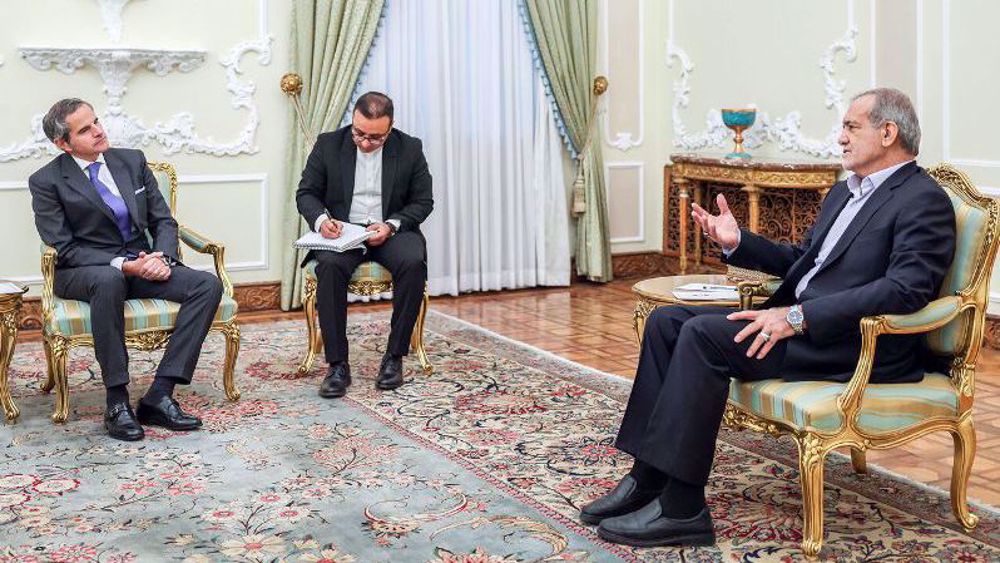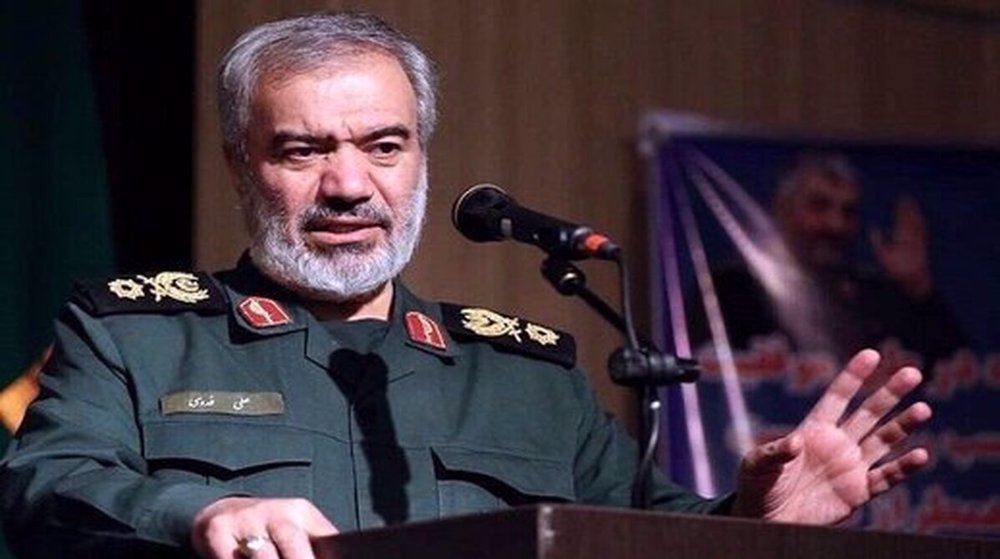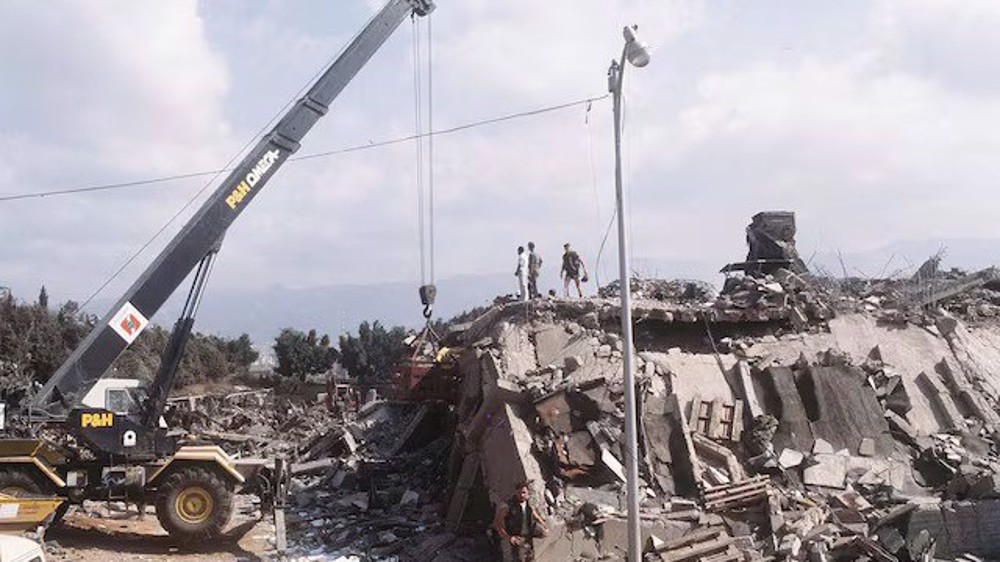Iran says taking measures to counter US after unrest
Iran says measures are being taken to counter US officials’ intervention in the recent unrest which was triggered by the Iranian government’s decision to hike gasoline prices.
The decision was part of Iran’s belt-tightening in the face of US sanctions which have hit ordinary Iranians the hardest. While US officials said they supported the protesters, they imposed new sanctions on Iran last week.
“We think these statements and interventions are made not out of friendship and goodwill with the Iranian people, but aim to stoke up tensions,” Foreign Ministry spokesman Abbas Mousavi told reporters in Tehran Monday.
On Saturday, US Secretary of State Mike Pompeo tweeted: "As I said to the people of Iran almost a year and a half ago: The United States is with you."
Pompeo was referring to the time when he curiously said Washington’s tough sanctions were aimed at giving the Iranian people a chance to have better lives.
Pompeo had earlier told BBC Persian that Iranian officials must listen to Washington "if they want their people to eat."
On Sunday, Mousavi denounced Pompeo’s new tweet. “Iran's noble nation knows well that such hypocritical statements are completely void of sincere sympathy," the spokesman said.
Russian Foreign Ministry spokeswoman Maria Zakharova said Pompeo’s tweet “left us puzzled since most of the things that sparked the discontent and other processes that are taking place in Iran were actually brought upon the Islamic Republic by the US’ own actions.”
She said Tehran’s decision to raise fuel prices was the result of the “illegal and massive sanctions pressure” that the White House is exerting on the Islamic Republic, adding Iranians’ rights to receive food, medication, and other necessities have been violated due to Washington’s so-called punitive measures.
Iran has been trying to take the sanctions in its stride, working through a raft of measures which could ease up the pain for the most needy families.
The Iranian government this month raised gasoline prices which still remain the cheapest in the world. The decision triggered peaceful protests which turned ugly when “saboteurs” went on a violent rampage, torching banks and gas stations, while armed assailants targeted police and security forces.
Mousavi said Monday, “We recognize the right to peaceful assembly. In recent years, similar incidents have happened where people had certain grievances and were able to express them.”
“However, more unsavory than the recent events was the meddling of foreign countries which we condemn, because Iran regards protests as the right of the people and this is stipulated in the Constitution,” he added.
Mousavi said Iran makes a distinction between peaceful protesters and the armed groups which have taken advantage of the situation to cause mayhem.
Most countries involved in the unrest did so willingly, for which they should accept responsibility, he said, adding terrorist groups also engaged in certain acts which the judiciary and security agencies are investigating.
Mousavi also took aim at Pompeo asking Iranian protesters to send the US any photos or videos of violent protests, with a pledge to use the evidence as the basis for new sanctions.
“I am surprised by certain countries whose foreign secretary and foreign policy spokesman has come to such a low as to ask for videos and pictures from riots and arson,” he said.
Pompeo made the request on Thursday night on Twitter, in both Farsi and English, directing protesters to a “secure messaging service” to send any documentation of protests.
Mousavi said rallies planned in Tehran on Monday would show the world who the “real” Iranians are.
“I recommend they (foreign countries) look at the marches held theses days, especially today, to see who the real people in Iran are and what they are saying,” he said.
People in Tehran were planning to hold a massive rally, beginning at 14:30 p.m. (1100 GMT), to condemn the recent riots and reiterate support for the Islamic Republic.
Mousavi explained that Iran recognizes free access to information as a right, and that the Internet shutdown during the riots was only meant to safeguard national security, adding that connectivity to the worldwide web was restored nationwide as the situation improved.
Three states endorse Iran peace initiative
The official said three countries had given their written approval to an initiative put forward by President Hassan Rouhani for regional cooperation to ensure peace in the Strait of Hormuz.
More countries were also considering the proposal, Mousavi added.
The Hormuz Peace Initiative seeks to pool indigenous resources among the Persian Gulf’s littoral states towards the provision of security for the vital maritime route, which plays host to a great portion of the world’s oil shipments.
Mousavi said Iran continues to reject all forms of foreign intervention in the region, noting how such meddling has brought along instability and insecurity.
Pence visit ‘futile maneuvering’
The Iranian official also reacted to a recent “surprise” visit by US Vice President Mike Pence to the semi-autonomous Iraqi region of Kurdistan, under the pretext of spending the Thanksgiving holiday with some of the Iraq-based American forces.
He said Pence had acted “in bad taste to make the independent visit in violation of diplomatic protocols,” noting that Baghdad had also reacted to the unannounced trip.
“We do not pay attention to such propagandist and futile maneuvering. Neither does the Kurdistan’s government,” he added.
Jason Rezaian's case
Mousavi also commented on a US federal judge’s order that Tehran pay $180 million in compensation over the 18-month detention of a Washington Post correspondent found guilty of subversive action targeting the Islamic Republic.
Jason Rezaian was arrested in Iran on July 22, 2014 on charges of espionage, collaborating with hostile governments, gathering classified information and disseminating propaganda against the Islamic Republic. He, however, was released on January 16, 2016.
Mousavi said Rezaeian had been kept in Iran as a “security suspect” on the basis of available evidence and his own confession.
Accordingly, he was sentenced to maximum punishment, but Tehran commuted his sentence, and later released him at the discretion of the Supreme National Security Council.
The spokesman said Tehran therefore considers the US court’s verdict to be invalid, noting that American tribunals cannot simply go about issuing rulings targeting Iran as they see fit.
Hezbollah strikes multiple Israeli targets in fresh retaliatory operations
VIDEO | New Zealand: Maori MPs protest in parliament with Haka war dance
Pezeshkian: World has come to believe Iran seeks peace, security
Houthi: US bombs inflame, escalate wars of extermination in West Asia
VIDEO | Press TV's news headlines
UN report says Israel’s methods in Gaza align with ‘genocide’
Attempts to dehumanize Hamas resistance movement doomed to fail
BRICS offers Turkey partner status, says Turkish minister














 This makes it easy to access the Press TV website
This makes it easy to access the Press TV website